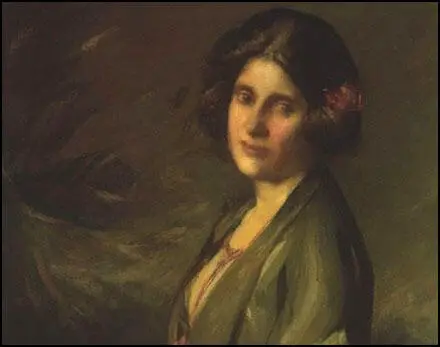Inez Bensusan
Inez Bensusan, the daughter of mining agent, Samuel Levy Bensusan, was born in Sydney, into a wealthy Jewish family, on 11th September, 1871. She worked as an actress in Australia before moving to London in about 1893 where she became involved in the struggle for women's suffrage.
Bensusan became a member of the Women's Social and Political Union and in 1908 she joined with Elizabeth Robins, Kitty Marion, Winifred Mayo, Sime Seruya, Edith Craig, Ellen Terry, Lillah McCarthy, Sybil Thorndike, Lena Ashwell, Lily Langtry and Nina Boucicault to establish the Actresses' Franchise League.
The first meeting of the AFL took place at the Criterion Restaurant at Piccadilly Circus. The AFL was open to anyone involved in the theatrical profession and its aim was to work for women's enfranchisement by educational methods, selling suffrage literature and staging propaganda plays. The AFL neither supported nor condemned militancy.
Inez Bensusan oversaw the writing, collection and publication of Actresses' Franchise League plays. Pro-suffragette plays written by members of the Women Writers Suffrage League and performed by the Actresses' Franchise League included How the Vote was Won and A Pageant of Great Women (Cicely Hamilton) and Votes for Women (Elizabeth Robins).
Bensusan's first play, The Apple, was performed as part of a weekend protest organised by the WSPU against the Census in April 1911. The following year Bensusan wrote The Womanhood, in which she played the principal character. Bensusan was also the author of Nobody's Sweetheart (1911) and the suffrage film True Womanhood.
Bensusan helped form the Jewish League for Woman Suffrage in 1912. She joined the executive committee of the organisation whose main objective was "to demand the Parliamentary Franchise for women, on the same terms as it is, or may be, granted to men." One member wrote that "it was felt by a great number that a Jewish League should be formed to unite Jewish Suffragists of all shades of opinions, and that many would join a Jewish League where, otherwise, they would hesitate to join a purely political society."
In December 1913 she established the Women's Theatre Company, at the Coronet Theatre. The main objective of the organization was "to widen the sphere of propaganda still further by establishing a permanent season for the presentation of dramatic works dealing with the Women's Movement." According to Elizabeth Crawford, the author of The Suffragette Movement (1999): "It's first, and only, season was a success; its second was pre-empted by the outbreak of war."
During the First World War she took the Women's Theatre Company overseas to entertain the troops. She also appeared in two films, The Grit of a Jew (1917) and Adam Bede (1918). She stayed there for three and half years, appearing in fifty plays for the British Rhine Army Dramatic Company at the Deutsches Theatre, Bismarckstrasse.

Bensusan continued to act and had a major success in The Matriarch by Gladys Bronwyn Stern, which ran at the Royalty Theatre for 229 performances in 1929 and toured America in 1930. The play centers around two characters, the matriarch Anastasia and her granddaughter, Toni.
Bensusan also remained actively involved with the Actresses' Franchise League. After the war she co-founded the House of Arts in Chiswick to encourage local theatre, music, and art and appeared in a House of Arts drama circle triple bill in Chiswick Town Hall in 1951.
Inez Bensusan died at 49 Eaton Road, Sutton, Surrey, on 10th October 1967.

